Can plastic be washed in the dishwasher?
A dishwasher (DWM) acts quite aggressively on materials. Experts say that many types of polymers from which tableware is made can be placed in the car. However, there are some nuances that need to be understood.
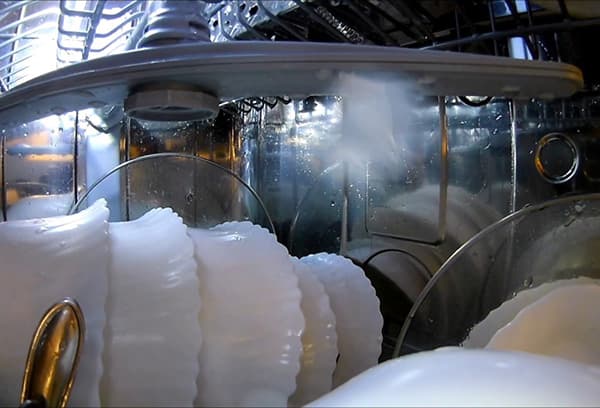
What's going on inside?
During washing, the dishes inside the machine are exposed to hot water and chemically active substances contained in detergents. These factors effectively destroy the fatty film and remove stuck pieces of food. But they can also significantly damage the dishes: wash away the painted layer, clean off the gilded pattern, and deform the material.
To understand whether the plastic will withstand such washing, you need to know the exact values of all parameters. They may differ slightly depending on the PMM model, but for most machines they will be within the following limits:
- Water temperature – from +50°C to +75°C.
- The duration of the cycle of soaking, washing and rinsing is up to 4 hours.
- Exposure to active substances in dishwashing detergents. Many formulations contain anionic surfactants. These substances are good at breaking down grease and other contaminants, but may be unsafe for the material from which the dishes are made.
- When drying, the dishes are blasted with hot air at a temperature of about +60-70°C, depending on the PMM model and the set mode.
Some dishwashing detergents also contain abrasive particles.These are hard grains that effectively remove dried deposits from baking sheets and plates. However, abrasives destroy the surface of dishes and the walls of the working chamber of the machine, so it is better to avoid purchasing detergent compositions containing this component.
Knowing the conditions in which the dishes are located, it is easy to assess their ability to survive the wash cycle. To understand whether it is possible to wash plastic containers, parts of food processors and other utensils made of polymers, let’s get acquainted with their properties.
A few words about plastic
The main difficulty that arises when assessing the ability of plastic to withstand machine washing conditions is that polymers are a whole family of materials whose properties can differ significantly. To understand whether the container can be placed in the PMM or whether it is better to send it to a regular kitchen sink, look at its bottom. Today, manufacturers put conventional symbols and inscriptions on products that allow (or prohibit) washing in a dishwasher.
If there is no such marking, pay attention to the icon in the form of a triangle formed by three arrows. There is a number inside that indicates the type of plastic. It will show the suitability of the container for storing food and washing it in PMM:
- The “PET” marking or the number “1” is placed on products made of polyethylene terephthalate. This plastic is relatively safe; bottles for drinks and vegetable oil, containers, and disposable tableware are made from it. These containers can be washed in the dishwasher.
- Another safe plastic is polypropylene. It is marked with the number "5" or the letters "PP". Polypropylene is not afraid of cooling down to -40°C and heating up to +140°C. It is resistant to many solvents and detergents.Therefore, dishes and containers made from this polymer can be placed in the dishwasher and washed in all modes.
For detailed information on the types of dishes that can and cannot be washed in your dishwasher, please refer to your user manual. The manufacturer also posts this information on its website.
Which plastics are dishwasher safe?
Some polymers are not resistant to high temperatures and detergents. When exposed to such aggressive conditions, they begin to melt and lose their original shape. In addition, during thermal decomposition, these materials begin to release toxic substances.
Here are the most dangerous polymers in this regard:
- Polystyrene. It is marked with the letters PS or the number 6. When heated to a temperature above +40°C, this polymer begins to release a toxic substance - styrene. Plastic is safe when used for food purposes, which is why, for example, disposable cups are made from it. But you cannot wash such dishes in a machine.
- Polyvinyl chloride. Marked with the number 3 or the letters PVC. Low-quality varieties of this plastic contain hazardous substances: mercury, bisphenol-A, cadmium. In addition, when heated, toxic chlorine compounds are released. PVC is not suitable for food use. Containers made from it cannot be washed in the dishwasher.
You should also refrain from washing products marked with the number 7 in the dishwasher. This group includes various plastics, some of them are safe, while others are not.
It is worth remembering a simple rule: if there is any doubt about the safety of plastic, it should not be put in the dishwasher.It is better to spend 15 minutes washing a potentially dangerous product by hand than to be poisoned by the toxins it contains.
If there is no identification mark
Some plastic products are devoid of any markings. Perhaps the badge was applied to a paper label, which was then lost or missing altogether. In this case, its suitability for washing in the dishwasher can be determined by indirect signs.
First of all, pay attention to the purpose of the product. For example, baby bottles and other children's products are made of safe plastic and painted with harmless dyes. In addition, their very purpose requires frequent sterilization with boiling water. Therefore, such a bottle can be placed in the PMM tray without fear of consequences.
Obviously disposable household items (packaging for cakes and pastries, trays for greens and frozen semi-finished products) and utensils (spoons, cups, forks, etc.) cannot be placed in the car. Because these items are not intended to be reused, manufacturers make them thin-walled, which increases the risk of melting. In addition, in most cases, cheap polystyrene is used for production, which is afraid of heating.
Pay attention to the thickness of the walls of the container. If the plastic is thick enough and elastic to the touch, it will survive washing in any mode. For example, flower pots, cups for toiletries, high-quality soap dishes, toothbrushes, etc. have such properties.
Be careful when filling your dishwasher, and your appliance will serve you for many years without any unpleasant surprises.
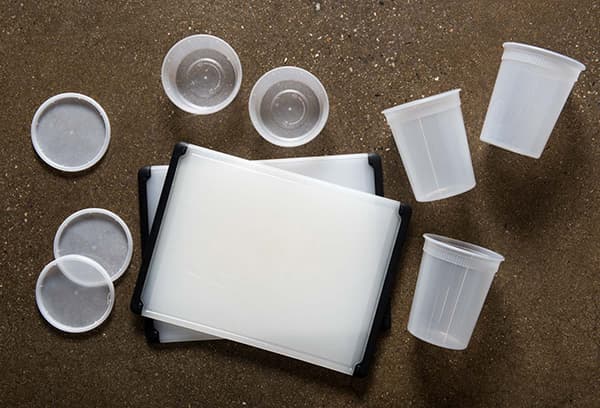
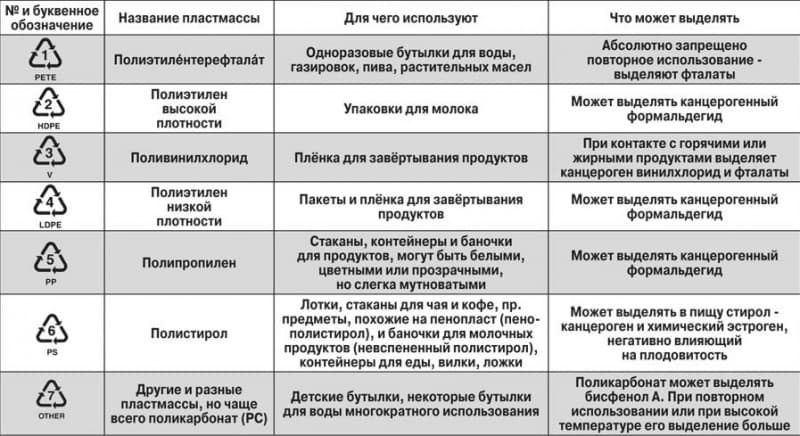
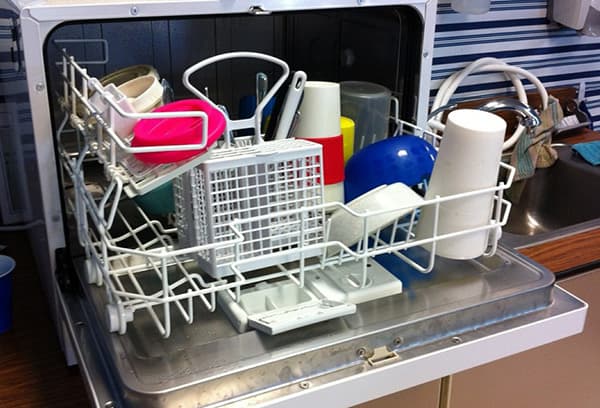
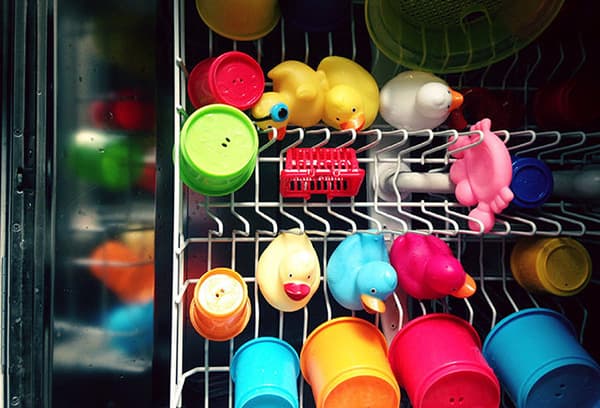
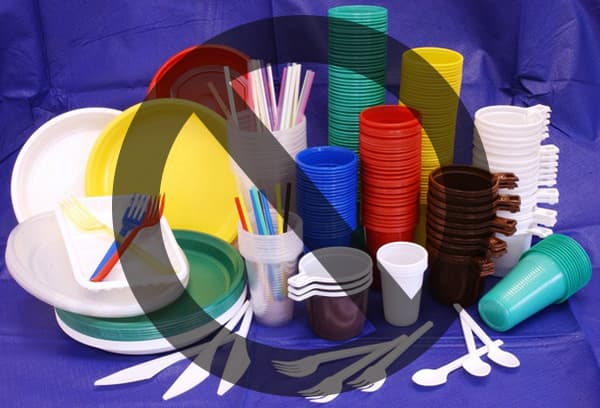
Yes, in principle, I don’t have anything other than 5pp, so I calmly stuff everything into the indesit and wash it
I double-checked all the plastic containers; all but one are dishwasher safe. Now I will buy more carefully so as not to get confused later on what can and cannot go in the dishwasher.